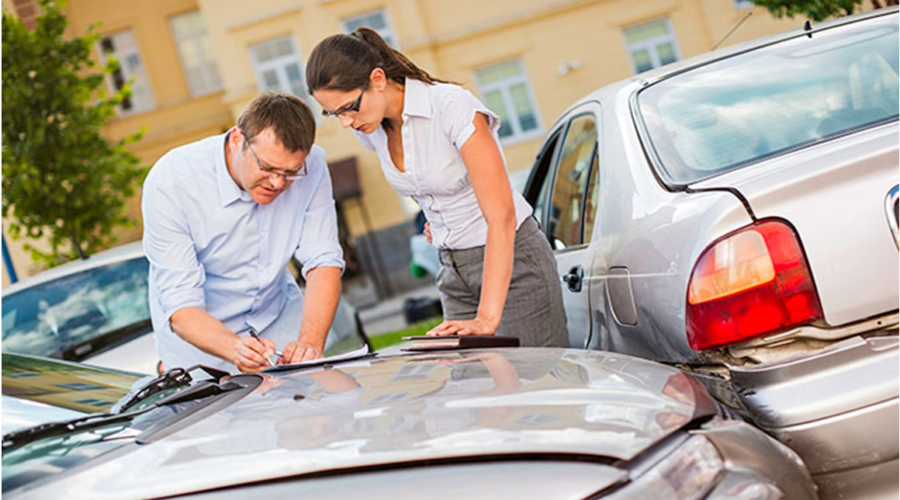Few people get in their vehicles with the idea that they might be involved in wrecks. Unfortunately, unexpected car accidents occur fairly frequently. While the majority of car crashes are relatively minor and only involve property damage, serious accidents causing injuries and fatalities also sometimes occur.
It is difficult for most people to know what to do in the immediate aftermath of a car crash. When you are involved in a wreck, your body’s fight-or-flight response kicks in and causes your adrenaline levels to increase. This might cause you to feel confused and mask the symptoms of injuries that you might have sustained. It can be particularly hard to know how to react to a wreck if you have never been involved in one or if it has been years since a previous collision. To help you understand how to react and what to do following an automobile accident, we have created this accident checklist that you can keep handy in your glove box if an emergency arises.
Steps To Take After a Car Crash
If you are involved in a collision, follow the steps below.
1. Stop Your Vehicle and Remain at the Scene.
Whenever you are involved in a collision, you should stop at the scene and remain at least long enough to exchange information with the other driver. If someone has been injured, you should also render first aid to him or her until help arrives.
It is a criminal offense in most if not all U.S. jurisdictions to leave the scene of an accident even if you were not at fault. If you collide with a parked vehicle and cannot find the owner, you must still leave your name, contact information, and insurance information on the vehicle where the owner can find it. You must also file an accident report within 24 hours.
If you are involved in a collision causing injuries or death, leaving the scene of an accident can be charged as either a misdemeanor or felony in most states. For example, under Cal. Veh. Code § 20001, If you are convicted of a misdemeanor hit and run causing injuries or death, you could be sentenced to serve up to 12 months in jail and be fined up to $10,000. If you are convicted of a felony hit and run, you could be sentenced to serve from 16 months to three years in prison and be fined up to $10,000.
You need to remain at the accident scene and summon help. If the accident scene is unsafe, move your vehicle to the nearest safe location, and call for help.
2. Check Yourself and Everyone Else for Injuries.
Once your vehicle is at a stop, check yourself and everyone else involved for injuries. If anyone is injured, provide first aid to him or her. Do not move injured victims who appear to have suffered back, neck, or head injuries unless doing so is necessary for their safety. For example, if there is a fire, you will need to carefully move a victim with suspected neck or back injuries.
3. Call 911.
Following an accident involving injuries or death, you should always call 911 for help. Tell the dispatcher if anyone has been injured and the location where your accident happened. While it is also a good idea to call the police after a property-damage-only accident, the police might not respond to the scene. In that case, make sure to file an accident report at the nearest law enforcement agency as soon as possible.
If the police respond to the scene, tell the officers exactly what happened in the moments leading up to the crash. Do not apologize or admit fault. Something might have happened to cause your accident that you are not aware of.
Similarly, you should not deny that you are injured. Because of the excitement following an accident, injuries can sometimes not show symptoms for several hours or days following a collision. If the officer asks you if you have any injuries, simply tell him or her that you are unsure and want to get checked out by your doctor.
4. Exchange Information With the Other Driver.
Whenever you are involved in a collision, you must exchange information with the other driver. Get the other driver’s name, address, phone number, insurance information, and vehicle registration information. The vehicle registration information is important when the motorist is driving a vehicle that belongs to someone else so that you can identify the owner. If you can, take a photo of the motorist’s driver’s license. You should also provide all of the same information to the other driver about yourself and your vehicle.
If the other driver is belligerent or threatening and will not exchange information with you, remain in your vehicle and lock the doors. Call 911, and wait for the police to arrive. The police will get the other motorist’s information for you if necessary.
5. Get the Names and Contact Information of All Witnesses.
If anyone saw what happened, ask him or her to stay and tell the police what he or she observed. Get the names, phone numbers, emails, and addresses of any witnesses who saw your accident. Ask the witnesses to tell you what they observed, and take notes. Witness statements can be very helpful when you are trying to prove your claim later on.
6 Document the Accident Scene.
Documenting the accident scene is critical following an accident. If you can, use your smartphone or camera to take as many photographs as possible, and also videotape the scene.
Take pictures of the following things:
- Damage to both vehicles
- Positions of both vehicles
- The other car’s license plate, make, and model
- Tire skid marks
- Road conditions
- Weather conditions
- Important nearby markers, including intersections, street signs, traffic control devices, speed limit signs, and anything else that might be relevant to your collision
- Your injuries
Photographic evidence can be very helpful in determining liability when the insurance company disputes the liability of its insured. Pictures and video can also help an accident reconstruction expert and an attorney determine who was at fault for causing the wreck and what occurred in the moments leading up to it. If you are injured and cannot take photos, ask a friend or family member to take them for you.
7. Seek Medical Attention.
If you have sustained serious injuries, go directly to the emergency department. Tell the police you need immediate medical attention and do not refuse help from the emergency responders on the scene. You can seek compensation for the cost of the ambulance later in an insurance claim. It is more important for you to receive prompt treatment than to worry about the cost of an ambulance ride.
If you are unsure of whether you have been injured, you should still seek prompt medical attention. Do not wait for weeks to see a doctor. Some serious injuries might not be immediately noticeable. Go to your doctor’s office for a medical examination as soon as possible. Doing this can help you to receive an accurate diagnosis of any injuries and the treatment you need to speed your recovery from them. Waiting to see a doctor can instead cause your injuries to significantly worsen and can also make it more difficult to prove to the insurance company that your injuries were caused by the collision and not some intervening incident.
8. Report Your Accident to the Insurance Company.
Contact the other driver’s insurance company if he or she was at fault to report the accident. Do not agree to provide a statement to the other driver’s insurance company or to sign a medical authorization. Since you are not insured by the other driver’s insurance provider, you are not legally obligated to provide a statement to its representatives. Insurance companies often use statements accident victims make to try to minimize their claim amounts.
If the other motorist is underinsured or uninsured, you should also report your accident to your insurance company. If you have uninsured and underinsured motorists coverage, you can file a claim with your company for coverage of any amounts that are not covered by the at-fault driver’s policy. When you report your accident to your insurance company, keep in mind that you do have a contractual obligation to talk to the insurance company about what happened. Most insurance companies include provisions within their policies requiring their insureds to cooperate with their investigations. Your attorney can help you know what to say and can handle the communications with the insurance companies involved for you so that you can focus your attention on recovering from your injuries.
Knowing what to do after an accident can be hard for most people. Following these tips should help you to get the help you need while preserving your rights as a potential claimant.

